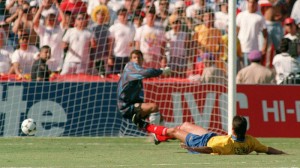Since we have been discussing South American dictatorship and the role of soccer in South American politics, I thought it would be interesting to share this great documentary titled The Two Escobars. It is the stories of Andrés Escobar, a defender on the Colombian national team in the 1994 World Cup, and Pablo Escobar, a Colombian drug lord who financed the development of Colombian soccer through cocaine trafficking in his Medellín cartel. Interestingly, Pablo owned the soccer team that Andrés represented and he supported Andrés in his ascension as a popular figure in Colombia. After Andrés conceded an own goal against the United States, Colombia lost the match and failed to advance past the group stages. When Andrés played down the loss by stating that it was “not the end of the world”, he was shot to death in Medellín. Humberto de la Calle, the Colombian president at the time responded saying, “Colombia’s problem is that football is no longer a sport, it seems, but a matter of life and death.”
Thus, the film goes on to delve into the complex relationships between politics, sport, and crime. I thoroughly enjoyed the documentary style investigation of this intersection of sport and national politics portrayed on a global stage through the World Cup. To learn more about Colombian Soccer, there is a great article by Courtney Ginn on the Soccer Politics Blog detailing these national issues and offering great insights into the state of affairs at the time.
1- http://espnfc.com/columns/story/_/id/937531/first-xi%3A-own-goals?cc=5901


I agree with both of the above comments as well. The two Escobars is a wonderfully done 30 for 30, and I too wonder what the connection between what FIFA knew and, if it did in fact know, if it would have done anything to stop it. The way the film portrayed the success of money laundering through soccer makes it hard for me to think no other teams have done so, even on a much smaller level
I’m a self-proclaimed 30 for 30 junkie, and this has to be one of my favorite documentaries of the series. The film pulls at the essence of what soccer politics really means, all the while setting the backdrop of a dichotomy of two of Colombia’s most recognizable figures.
As a non-soccer aside, if you love watching sports documentaries and are a fan of ESPN’s 30 for 30 series, definitely check out “June 17, 1994” and “You Don’t Know Bo”—two of my other favorites and incredibly well done.
I agree that this documentary fits in well with what we have been discussing in class lately. ESPN’s “30 for 30” documentary special did an excellent job at pinpointing the links between sports, politics, stereotypes, and basic human tendencies. This particular story about the “two Escobars” was easily one of my favorite from the 30 for 30 collection. Just like you said, it did a superb job at finding the interconnectedness of sport and politics (and, as you pointed out, crime) in parts of the world that we don’t pay much attention to outside of World Cup years. I question how much FIFA knew about the financial backing of the Columbian national team, and it leads me to wonder if there exist any national teams or clubs today that are funded through such illegal means.